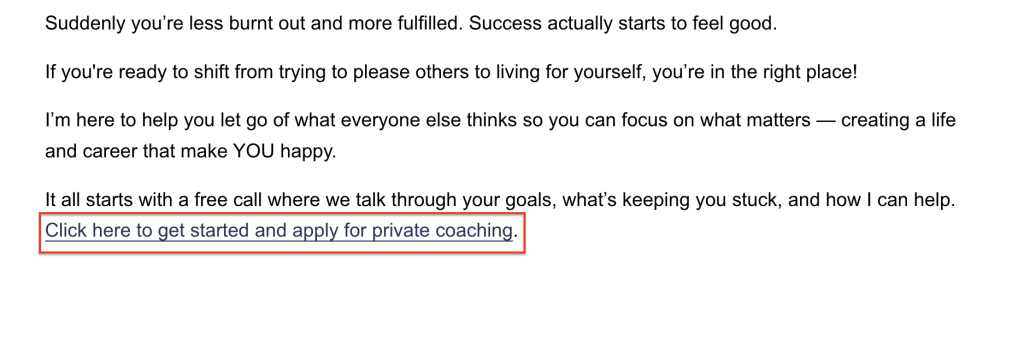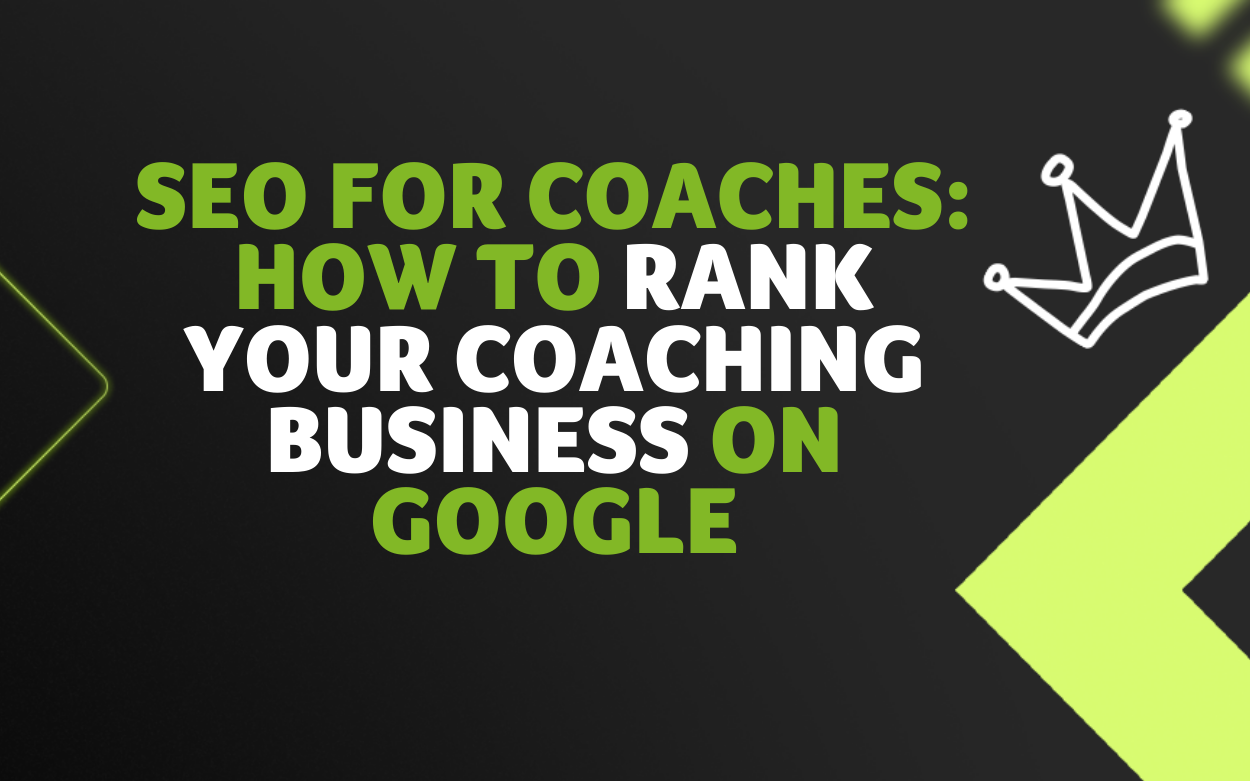
Ready to grow your coaching business with SEO?
You’re in the right place! In this guide, we’ll explain exactly what SEO is, why it’s one of the best marketing strategies for coaches, and how to get started.
You’ll learn:
- How SEO can help you rank higher on Google
- The key components of SEO (and how to implement them)
- Proven strategies to attract more clients organically
Let’s dive in!
Part 1: Understanding SEO for Coaches
What is SEO?
Search Engine Optimization aka SEO, is the process of improving your website to rank higher on search engines like Google and Bing.
The goal is simple: your website should appear at the top of the results when someone searches for coaching services or related topics.
For coaches, SEO ensures your expertise is visible to those seeking guidance. Imagine a potential client who types into Google: “life coach for confidence building.”
If your website ranks on the first page, they’re more likely to click on your site, read about your services, and reach out for help:
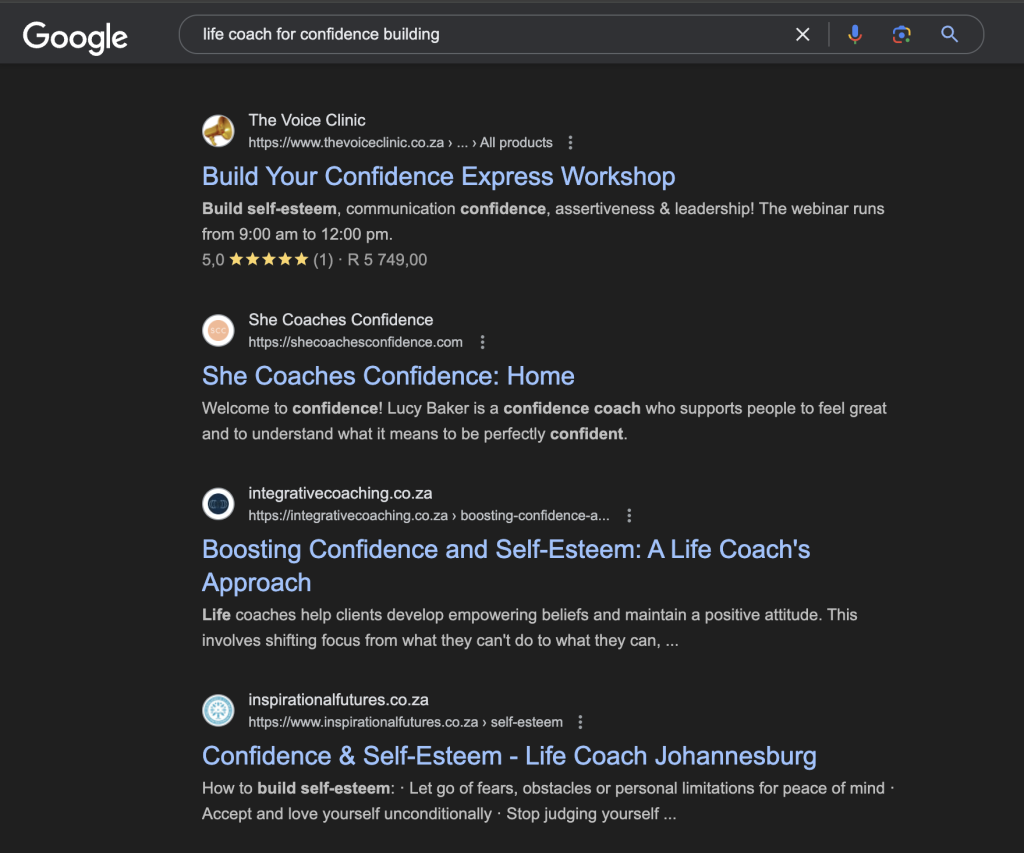
Source: Google
SEO goes beyond inserting keywords into content. It’s about making your coaching website valuable to users by offering answers to their questions, a smooth browsing experience, and trustworthiness—all of which Google rewards with higher rankings.
How does SEO fit into the marketing mix?
SEO is one piece of the marketing puzzle, but it’s an essential one. While social media and email marketing let you reach people you already know or engage with, SEO focuses on reaching brand-new audiences—people actively searching for coaching services or advice.
Unlike paid ads (which disappear once your budget runs out), SEO builds long-term traffic from search engines.
Once you rank for key terms, your website attracts potential coaching clients. And because SEO connects you with people searching for specific solutions, the leads you attract are often highly motivated and ready to take action.
For example, a strong SEO strategy could complement a social media post by bringing users to your blog for in-depth answers to their questions.
Combining SEO, social media, and email marketing creates a complete funnel—attracting new visitors, engaging them with content, and nurturing them toward conversion.
Why SEO is the best marketing strategy for your coaching business

Source: Free Pik
If you’re wondering, “Should I invest in SEO for my coaching business?” the answer is a resounding yes. SEO isn’t just another marketing tool—it’s the foundation for long-term success.
✨SEO is better than social media
Social media can be a valuable tool for engagement, but it’s a risky, ever-changing landscape. You don’t own your profile, algorithms dictate visibility, and content has a short lifespan.
In contrast, SEO consistently drives traffic to your website. Once optimized, your content generates leads in the long term—without needing constant updates. And unlike social media, SEO gives you control over your marketing, making it a more reliable foundation for growth.
✨You own your website
Every dollar you invest in your website stays with you. Unlike social media or ads, where you’re essentially renting space, SEO improves the value of your own property—your website. The blog posts, guides, and resources you create don’t disappear after 24 hours; they continue attracting potential clients for years.
Investing in SEO means building sustainable growth for your coaching business and creating content that works for you long after it’s published.
✨SEO supports growth
With SEO, you can estimate how much traffic and how many leads you’ll generate from specific keywords or blog posts. For example, a post attracting 2,000 monthly visitors could consistently attract coaching clients.
✨You can target your coaching niche
With keyword research, you can understand exactly what your target audience is searching for. Whether it’s answering questions like “how to set personal goals” or addressing concerns like “am I bad at sales,” SEO allows you to target specific, high-intent audiences.
✨You meet clients when they’re ready to act
When someone searches on Google, they’re actively looking for a solution—and often ready to spend money to do so. Unlike social media, where you’re trying to interrupt someone’s scrolling, SEO connects you with people who are already motivated to find a coach. This higher intent leads to better-quality leads and faster conversions.
✨Builds trust and credibility
People trust Google’s organic results far more than paid advertising. Ranking high on search results signals to potential clients that your website is authoritative and credible. This trust factor translates into higher click-through rates and more inquiries for your coaching business.
That was a lot! By now, you understand the power of search engine optimization. The following sections will show you how to build a successful SEO strategy for your coaching business.
Part 2: The Foundation of SEO – Content and Technical Optimization
Create quality content
Forget those spammy, keyword-stuffed articles from the dark ages of SEO. Today, it’s all about creating quality content that pleases Google and wows your audience.
But what does “high-quality” even mean for coaches? Let’s break it down:
✔️ Relevant
Your content must align with the needs and interests of your life coaching audience. For example, someone searching “how to find a life coach” wants actionable advice, not unrelated topics or broad overviews.
To ensure relevance:
- Focus on addressing challenges specific to life coaching.
- Avoid off-topic content, like holiday shopping guides.
- Use tools like Google to explore what’s ranking and what questions are being answered to meet your audience’s needs.
✔️ Professional
Typos and grammar errors? Not on your watch. Well-written, polished content reflects your professionalism and positions you as more than just a coach—it shows you’re someone clients can trust with their personal growth and big life decisions.
✔️ Original
Google hates duplicate content. Your articles and posts should be fresh and original and offer a unique perspective. As a coach, you’re already an expert. Use your voice to write about topics in a way that’s authentic to you.
Avoid jargon and instead focus on offering real, practical advice. Google values expertise, and your unique perspective will help your content stand out.
✔️Comprehensive
Google favors in-depth, long-form content. Studies show that the average first-page result on Google is nearly 1,500 words. Longer content typically covers a topic more thoroughly, which helps answer all a user’s questions.
✔️ Trustworthy
Google values content created by subject matter experts, making coaches uniquely positioned to succeed. To stand out, ensure your content reflects E-E-A-T principles:
➡️ Experience: Share real-life coaching examples.
➡️ Expertise: Highlight your certifications or training.
➡️ Authoritativeness: Offer actionable insights that demonstrate your credibility.
➡️ Trustworthiness: Provide testimonials and ensure your website is secure.
You can enhance your credibility by incorporating:
- Expert quotes or interviews
- Links to studies or credible resources
- Engaging multimedia, like images, videos, or infographics
✔️ Keyword-rich
Keywords are the words and phrases people type into search engines when looking for information, products, or services. In content creation, they act as a guide to help search engines understand the topic of your content and match it to relevant user searches.
Use them strategically and naturally throughout your text so Google knows exactly what you’re discussing.
For example, in an article about “How to Find a Life Coach,” include relevant keywords like “life coach near me,” “life coaching services,” or “certified life coach” naturally within he content. Avoid keyword stuffing, as it can harm readability and your search rankings.
| 💡Key point: What is “keyword stuffing”?
Keyword stuffing is a frowned-upon SEO tactic where a web page or piece of content is overloaded with keywords to manipulate its ranking in search engine results. This can involve:
|
The more your content gets shared, the more comprehensive your reach will be, and the happier Google will be.
ℹ️ Here’s an example of what great content means: This Verywell Mind article “How to Boost Your Self-Confidence” is reviewed by an expert and combines actionable advice with an engaging, supportive tone. It’s well-structured, offering clear, digestible tips backed by psychological principles, making it both practical and trustworthy:
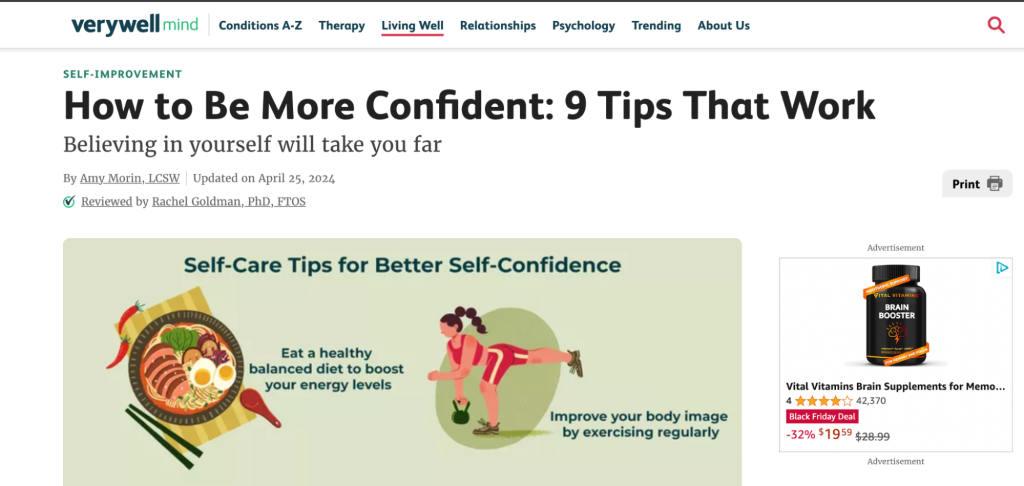
Source: Very Well Mind
If you are not sure how to do this yourself, don’t worry. We’ve got you covered below!
How to create your own content
1️⃣ Brainstorm content ideas
Before you start writing, take a moment to brainstorm content ideas that will resonate with your target audience.
Here are a few places to dig for inspiration:
- Client conversations: What questions do your clients constantly ask? What challenges do they face? Tap into those real-life conversations to uncover content goldmines.
- Online communities: Lurk in forums, Facebook groups, and social media pages where your ideal clients hang out. What are they talking about? What are their concerns?
- Competitor blogs: Scope out the competition and see what they’re writing about. Can you offer a fresh perspective on a popular topic? Or is there a gap in their content that you can fill?
- Keyword research tools (like Ahrefs): Use SEO tools to see what people are searching for. More on that below!
2️⃣ Perform keyword research
Using the right keywords throughout your content tells Google, “Hey, this is what my page is about!”.
We’ll show you how to find keywords with one of our favorite SEO tools, Ahrefs, below:
Start with a Seed Keyword
Enter a general topic related to your niche, like “holistic health coach,” “career coaching,” or “marketing coach,” into Ahrefs’ Keywords Explorer. We’ll use the keyword “holistic health coach.”
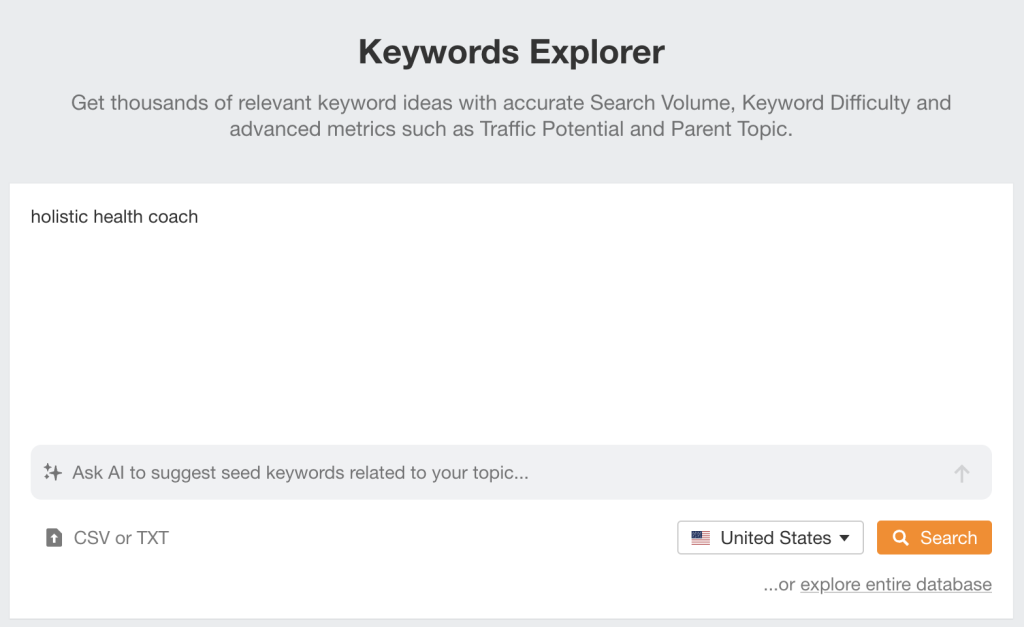
Source: Ahrefs
Analyze keyword metrics
Ahrefs will show you some data on your chosen target keyword, including:
📈Search Volume: How many people search for the keyword each month?
📈Keyword Difficulty (KD): How hard it is to rank for the keyword. For coaches, aim for medium-difficulty keywords that balance search volume and competition.
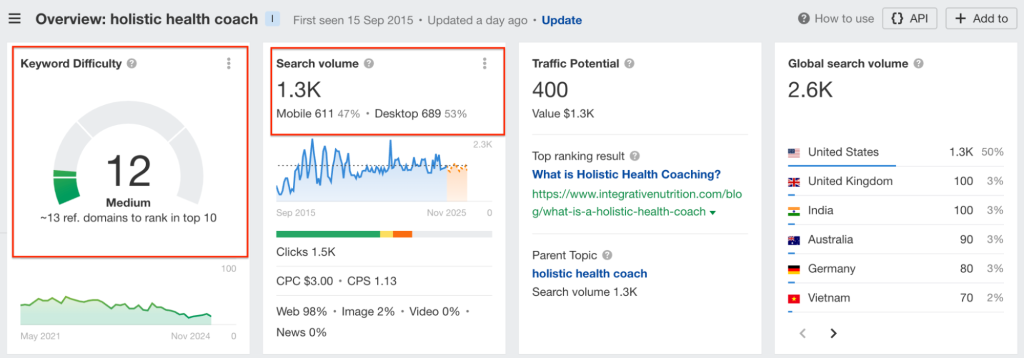
Source: Ahrefs
Explore keyword suggestions
Ahrefs will suggest keywords related to your main keyword, questions, and long-tail keywords that can spark even more content ideas for your coaching business. In the example below, there are a range of suggestions, including:
- What is a holistic health coach?
- Certified holistic health coach
- Holistic health coach certification

Source: Ahrefs
| 💡Key point: What is a long-tailed keyword? Long-tail keywords are longer, more specific phrases people use in their searches. They often have lower search volume but higher conversion rates because they target a more specific audience. |
Filter and refine
Narrow your list by focusing on relevant keywords that perfectly balance search volume and difficulty. You might uncover hidden gems with less competition but still plenty of potential traffic.
If you can’t find anything suitable, narrow your search. For example, high-value keywords like “life coach” are broad and competitive, with a Keyword Difficulty of 46:
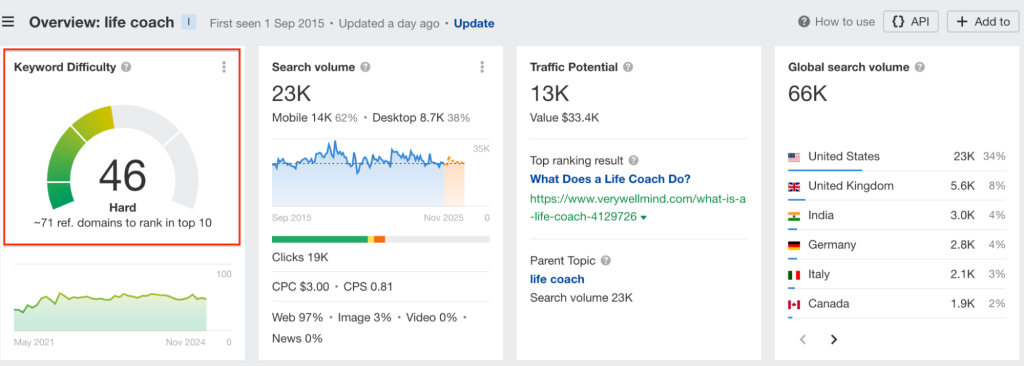
Source: Ahrefs
There is a way to work around this: Think local! Say you work out of Denver. You could try targeting “life coach Denver.” This keyword has a difficulty of 4, a search volume of 250, and a potential of 150 searches a month. For local coaching businesses, this is a good amount of traffic:
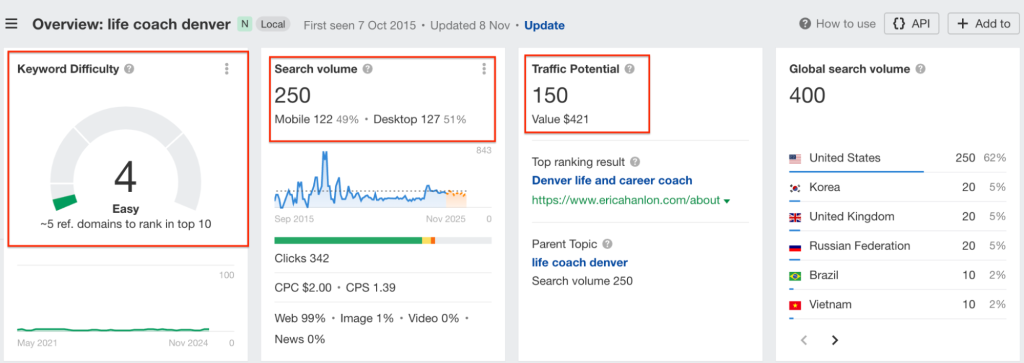
Source: Ahrefs
Check the SERP overview
See who’s currently ranking for your target keywords. Can you create even better and more informative content?

Source: Ahrefs
Download and organize
Once you’ve got your winning keywords, export them to a spreadsheet. Under “keyword ideas,” click on “view all.” This will take you to a detailed page with all related keywords. On the left-hand side, click “Export,” and choose to download the data in CSV format:

Source: Ahrefs
| 💡Pro-tip: Don’t have access to an SEO tool?
Don’t worry! To look for target keywords, you can use Google’s Keyword Planner. It’s a free tool that can help you with keyword research. |
3️⃣ Create a content plan
Once you’ve chosen your keywords, map them to different types of content:
- Blog posts: Answer common questions or provide in-depth guides.
- Service pages: Target keywords like “life coach in [city]” or “career coaching services.”
- Sales pages: Focus on keywords related to specific offerings or programs.
Be sure to map out your content plan. Decide which topics you’ll tackle and when you’ll publish them. A well-organized content calendar keeps you on track and ensures a consistent flow of fresh content.
4️⃣ Finally, write the content
Now comes the fun part: creating content that’s so good that people can’t help but share it. If writing isn’t your forte, enlist the help of professional writers and designers on Fiverr or Upwork. A polished, well-presented article goes a long way.
| 💡Pro-tip: You don’t need to always create new content!
You don’t always need to create new content to succeed in SEO. Sometimes, updating older posts with fresh information, new keywords, and better multimedia elements can boost search engine rankings significantly. |
On-page optimization
On-page optimization is like giving your website a professional polish to make it stand out to search engines and your potential clients. It ensures your site is easy to navigate, understand, and index, boosting your chances of ranking higher in search results.
Here’s a checklist of key on-page elements to optimize for your coaching website:
Title tags
These clickable headlines appear in search engine results and let users and search engines know what your page is about. For example:

Source: Google
ℹ️ Make sure your title tags are clear, include your main keyword, and give users a reason to click.
Meta descriptions
Meta descriptions are the short summaries that appear below your title in search results. They entice users to click by highlighting what they’ll gain from visiting your page

Source: Google
Headings (H1, H2, etc.)
Headings structure your content, making it easier for both users and search engines to navigate. Use H1 for your main page title and organize sections with H2s and H3s to keep things logical and reader-friendly:
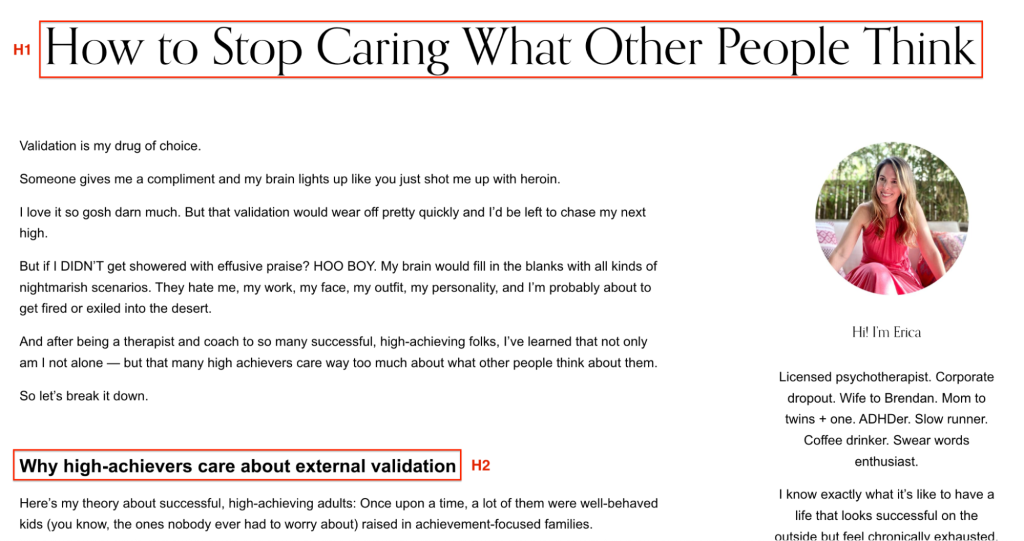
Source: Erica Hanlon Coaching
Image alt text
Adding descriptive alt text to your images improves accessibility and helps search engines understand your visuals. For example:
➡️ “Personal growth coaching session with a client at a coffee shop”
This can also help your images appear in Google Image searches, giving your site extra visibility.
Internal links
Link to related content on your site to improve navigation and help search engines understand your site structure. For example, in the example we shared above, the coach has linked her contact form to her blog post:
 Source: Erica Hanlon Coaching
Source: Erica Hanlon Coaching
Keyword usage
Incorporate target keywords naturally into your titles, headings, and content. For instance, if your keyword is “confidence coaching,” use it organically throughout your page. Avoid keyword stuffing, which can make content feel forced and hurt your SEO.
URL structure
Keep your URLs short, descriptive, and easy to read. Here’s an example:

Source: Erica Hanlon Coaching
Technical SEO basics
Technical SEO ensures your website is optimized for search engines behind the scenes, creating a strong foundation for better rankings and user experiences. Here’s what you need to know:
1️⃣ Security: SSL Certificates
An SSL certificate (indicated by the “https://” in your URL) encrypts data exchanged between your website and users, protecting sensitive information. For coaches, this is essential:
- It builds trust with potential clients, especially if you collect contact details or payments online.
- Google prioritizes secure sites, so having an SSL certificate can improve your rankings.
| 💡 Quick tip: Many hosting providers offer free SSL certificates—check with your host to ensure yours is activated. |
2️⃣ Page speed
A slow-loading website frustrates users and hurts your search engine rankings. Page speed is a ranking factor for Google because it directly impacts user experience.
For coaches, a fast site can mean the difference between a potential client staying to read your services or leaving for a competitor.
✅ How to Improve page speed:
- Compress images and use modern file formats (e.g., WebP).
- Minimize code and enable browser caching.
- Use tools like Google PageSpeed Insights or GTmetrix to identify and fix speed issues.
3️⃣ Mobile optimization
Most users will visit your site on their phones, so having a mobile-friendly website is non-negotiable. Google uses mobile-first indexing, which means it primarily evaluates the mobile version of your site for rankings.
Here’s how to optimize your coaching site for mobile:
- Responsive design: Ensure your website adapts to different screen sizes, from smartphones to tablets.
- Readable text: Avoid small fonts or text that require zooming.
- Clickable buttons: Use larger buttons to make navigation easier on touchscreens.
| 💡Quick test: Use Google’s PageSpeed Insights to check how your site performs on mobile devices. |
4️⃣ Flat website structure
A flat website structure ensures that all your pages are easy to navigate and accessible in just a few clicks. This benefits both users and search engines:
✅Improved user experience: Visitors can quickly find the information they need.
✅Better crawling: Having a flat website structure helps search engines to find new content on your website, increasing your chances of ranking higher.
Here’s how to create a flat structure on your own website:
The first thing to do is use a straightforward navigation menu to make exploring your site intuitive.
Next, organize your pages logically—think of a pyramid:
- Top-level: Home page
- Second level: Key pages like Services, About, and Blog
- Third level: Subpages like individual blog posts or service details
| 💡Pro tip: Use internal links throughout your content to avoid “orphan pages” (pages not linked anywhere on your site). |
Part 3: Building Authority Through Links
The third component of SEO for coaches is link building, which involves acquiring hyperlinks from other websites to your own.
Simply put, when another site links to your content, it’s like a vote of confidence, signaling to Google that your website is trustworthy and authoritative. These signals improve your rankings, making it easier for potential clients to discover you.
Take the article by Verywell Mind we mentioned earlier as an example. It has over 3,800 backlinks—meaning 1,600 websites have linked to their content:

Source: Ahrefs
That level of authority doesn’t just happen overnight; it’s built by consistently creating valuable, link-worthy content that others want to reference.
Below, we’ll discuss the best way for life coaches (or any kind of coach, for that matter!) to build backlinks.
| 👑 Building online authority for your coaching business is difficult. Let Authority Builders handle the heavy lifting with our proven link-building strategies. Get started today! |
Guest Posting
A guest post is an article or blog post written by someone who is not a regular contributor to a website but is invited to share their expertise or insights. It’s one of the most effective ways to earn backlinks while positioning yourself as an authority in your niche.
Step 1: Find relevant blogs or websites
Use tools like Ahrefs or Google search operators (e.g., “life coaching + write for us”) to discover opportunities.
Here’s how to find guest posting opportunities with Ahrefs:
➡️ Using Content Explorer to find relevant sites
- Open Ahrefs and navigate to Content Explorer.
- Enter a keyword or phrase relevant to your niche, such as “life coaching,” “career coaching,” or “confidence building.”
-
- Filter results to show only high-quality websites by applying filters such as:
- Referring Domains: Set a minimum number (e.g., 20) to find sites with good authority.
3. Traffic: Filter for sites with decent organic traffic (e.g., 1,000+ visitors/month).
Look for sites that publish blog content related to your niche and might accept guest posts.
➡️ Analyze competitor backlinks
- Go to Site Explorer in Ahrefs.
- Enter the URL of a competitor or a high-ranking coach in your niche.
- Click on the Backlinks tab to see who’s linking to their content.
- Identify blogs or sites that accept guest posts by checking their content and outbound links.
Securing link insertions on coaching or business blogs—by adding your link into existing posts—can be a powerful way to gain authoritative backlinks for your site.
| 💡Pro tip: Look for backlink sources that link to guest articles, as these are more likely to accept guest submissions. |
Step 3: Evaluate websites for quality
Before reaching out, evaluate potential sites for relevance and authority:
✔️Domain Rating (DR): Focus on sites with a decent DR (e.g., 30+).
✔️Traffic: Ensure the site receives organic traffic to guarantee your guest post reaches an audience.
✔️Relevance: Check if their existing content aligns with your coaching niche and audience.
Step 3: Pitch with purpose
Reach out to site owners with a personalized email. Highlight your expertise, your post’s value, and a specific idea for their audience. For example:
“Hi [Name], I’m a leadership coach with 10 years of experience helping executives build confidence. I’d love to write a post for your blog on [specific topic]. Your readers would benefit from practical tips on navigating workplace challenges.”
Step 4: Create high-value content
Deliver well-researched content that is engaging and aligns with the blog’s tone and audience. Here is an example of a high-quality guest post:

Source: The Coach Space
At the end of the post, there is generally a blurb about the guest poster and a valuable link back to their website:

Source: The Coach Space
Obtain PR backlinks
Another way to obtain backlinks is to position yourself as a credible expert and provide value to journalists, bloggers, and other media professionals.
You can do this by signing up for platforms like Qwoted, which connects journalists with experts and offers PR opportunities to share your insights.
| 💡Pro-tip Alternatives to Qwoted: While not as good as they used to be, alternatives like Connectively (formerly Help a Reporter Out) or SourceBottle are excellent for gaining media exposure. |
➡️ How it works: Sign up for these platforms and respond to journalist queries in your niche.
➡️ What to offer: Share unique insights or advice on topics you specialize in.
Get featured on podcasts
Podcasts are an excellent way to showcase your expertise and reach a highly engaged audience. Many hosts are eager for guest experts, making this a fantastic opportunity for coaches to share their stories and advice and secure backlinks to their websites.
Search for shows in your field, such as wellness, productivity, or leadership. Platforms like Spotify, Apple Podcasts, and Listen Notes can help you discover podcasts tailored to your audience.
ℹ️ For example, the Happiness Lab with Dr. Laurie Santos regularly features self-improvement experts from various niches.

Source: Pushkin
When you find the right podcast, you’ll need to contact the hosts and highlight your expertise and the value you can bring to their listeners.
Create infographics
Linkable content is the backbone of effective link-building strategies, and creating shareable infographics is one of the most powerful ways for coaches to attract backlinks.
Here’s why infographics are a game-changer for your coaching business:
✅ Visual appeal: Infographics present complex ideas—like the benefits of coaching or steps to overcome self-doubt—in visually engaging and digestible formats. This makes them highly shareable across blogs, websites, and social media.
✅ Educational storytelling: You can craft a compelling narrative using your expertise. For example, you can illustrate a coaching framework, highlight client success stats, or break down steps to achieve personal growth.
✅ Linkable assets: Eye-catching and informative infographics are often cited and linked to by other websites, positioning you as an authority while driving traffic to your site.
What’s great is that you don’t have to start from scratch! Repurpose your existing coaching content—like blog posts, client case studies, or research insights—into infographics to maximize their reach. This infographic on how to boost your confidence is a great example of an infographic:
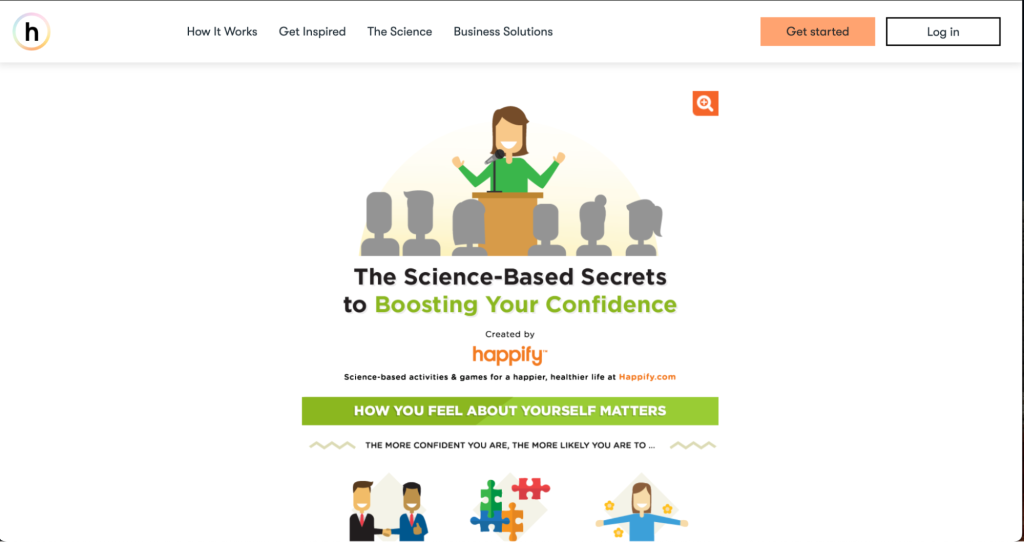
Source: The Upside
| 👑 Building online authority for your coaching business is difficult. Let Authority Builders handle the heavy lifting with our proven link-building strategies. Get started today! |
Final Thoughts: SEO For Coaches
SEO is one of the most powerful tools coaches can use to build authority and grow their businesses. By optimizing their website, creating valuable content, and building strong backlinks, they can attract their ideal clients, boost their credibility, and establish a lasting online presence. SEO provides a sustainable path to growth and success, whether they’re just starting out or looking to expand their reach.
But let’s face it—SEO can feel overwhelming. The process requires strategy, expertise, and consistent effort, from keyword research to link building. That’s where we come in.
At Authority Builders, we specialize in helping coaches like you grow their online presence through proven SEO strategies. Whether you need high-quality backlinks, expertly crafted content, or technical optimization, we’re here to help you take your business to the next level.
💡 Ready to grow your coaching business? Let us handle the hard work while you focus on what you do best—helping your clients thrive. Contact us today and start building an online presence that works for you 24/7.

